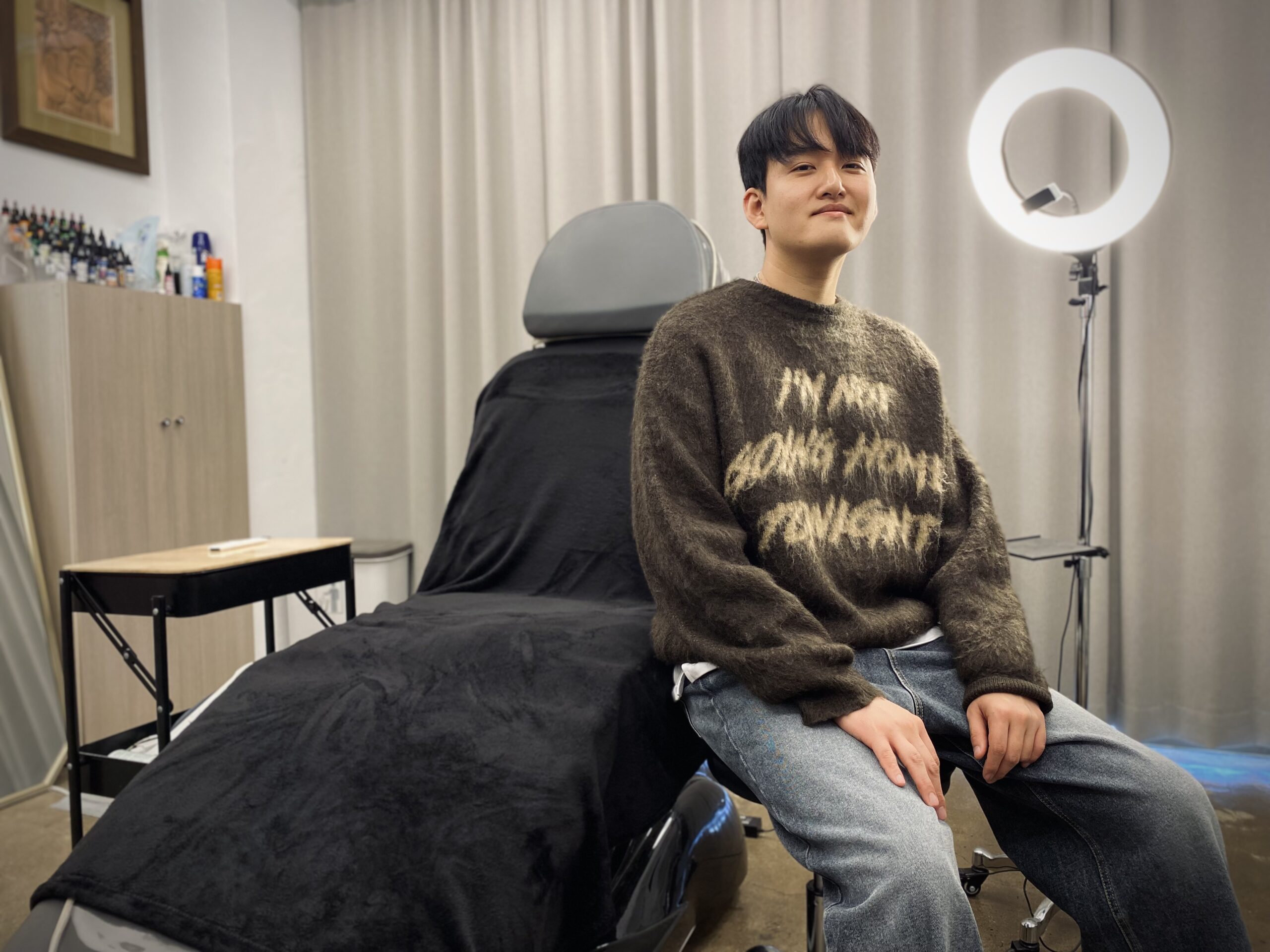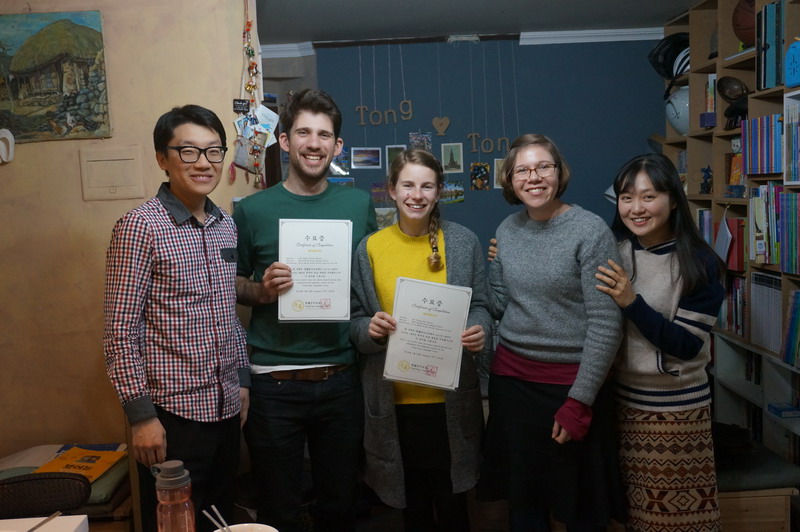Mastering Language the Tong Tong Way: Where Korean Becomes Easy
Interview by Melline Galani.
Photographs courtesy of Tong Tong Language Class.
Gwangju News (GN): Hello, and thank you for taking the time to do this interview. Please introduce yourselves to our readers.
— Hong Song-i: Hello, Melline. My name is Hong Song-i, and I am a native Korean instructor who has lived in Gwangju all of my life – except for a few years when I moved around with my father when I was younger and a single year when I went to the Philippines as an exchange student.
— Ahn Pyeong-an: And my name is Ahn Pyeong-an. I teach Korean here at Tong Tong. I am not originally from Gwangju, but I have lived here continuously ever since I completed my military service and entered Chonnam University. Gwangju is my second hometown.
GN: How did you become partners and how long have the two of you been working together?
— Ahn Pyeong-an: It has been over four years already since I started working at Tong Tong in 2017, but I met Song-i for the first time much earlier than that, in 2008. We met for the first time in Manila in the Philippines, where we were both exchange students and college colleagues together, but now we are partners and joint executives. You may not believe it, but Ms. Hong is older than you think [smiling]. I think I am lucky to have met such a good partner, but it is true that I was hesitant when deciding to work together because I thought about my family first. (I wanted to make a careful decision because she was my wife’s sister.)
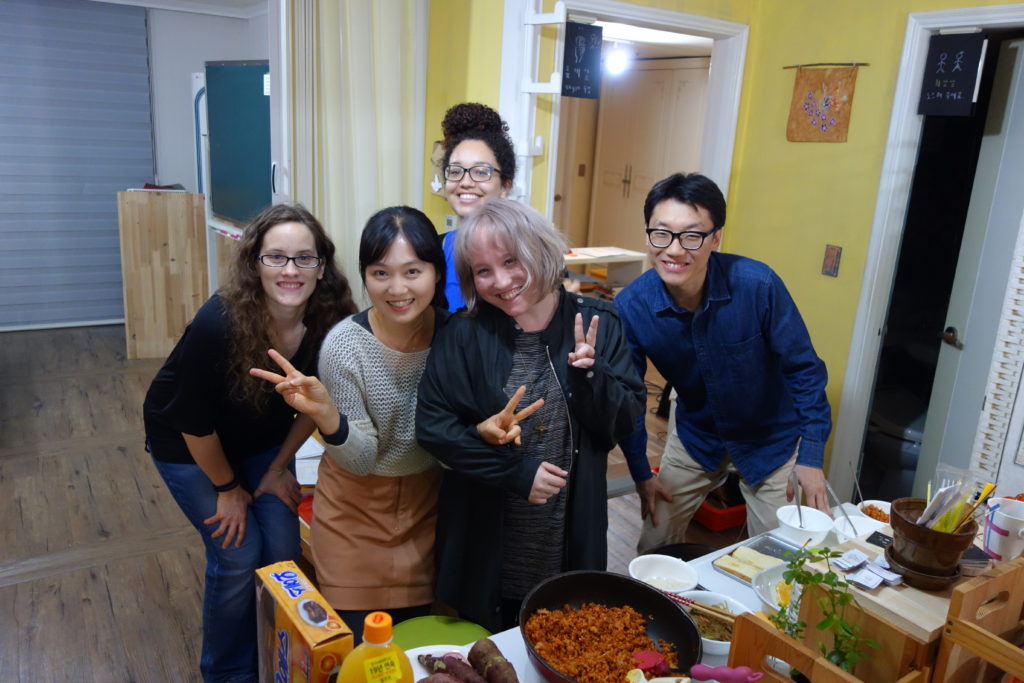
— Hong Song-i: Pyeong-an said I am older, but there is only a one-year difference between us. When we were students studying abroad together, the Korean Wave was in full swing in the Philippines, and I was originally interested in teaching Korean, so I worked in a Korean club called Arirang. Chan-song (another Tong Tong staff member), Pyeong-an, and I worked in the same club, and we began dreaming of working together because we worked so well with one another. When we came back to Korea, Chan-song and I first started our Korean language teaching business, and we finally succeeded in persuading Pyeong-an, who worked at a company, to join us. After that, a Korean-American language instructor, Yoo Mi-ran (Miranda New), also joined us, and ever since then we have had a total of four Korean teachers working together.
GN: What were you doing before you met in the Philippines?
— Hong Song-i: Before participating in the exchange student program, I taught Korean to international students while studying English at Chonnam National University. Even though it was my native language, teaching Korean was more difficult than I thought, so I started learning it systematically, starting with a teacher training course. Before I solidified my career as a Korean language instructor, I worked at an English academy, but I always had a dream to start a Korean language academy with people I liked. After this, I taught Korean as a volunteer at the Gwangju International Center, and later I became a coordinator there. Luckily, I was able to work at the GIC for three years under Dr. Shin Gyonggu, whom I respected very much. I made precious memories and learned a lot through the GIC that I will never forget. That was when I met my first Korean language class students, who are still close to me even though they are now scattered around the world – we still correspond from time to time. Thanks to my experience at the GIC, I began dreaming of having a language academy that would leave warm memories in the hearts of those involved.
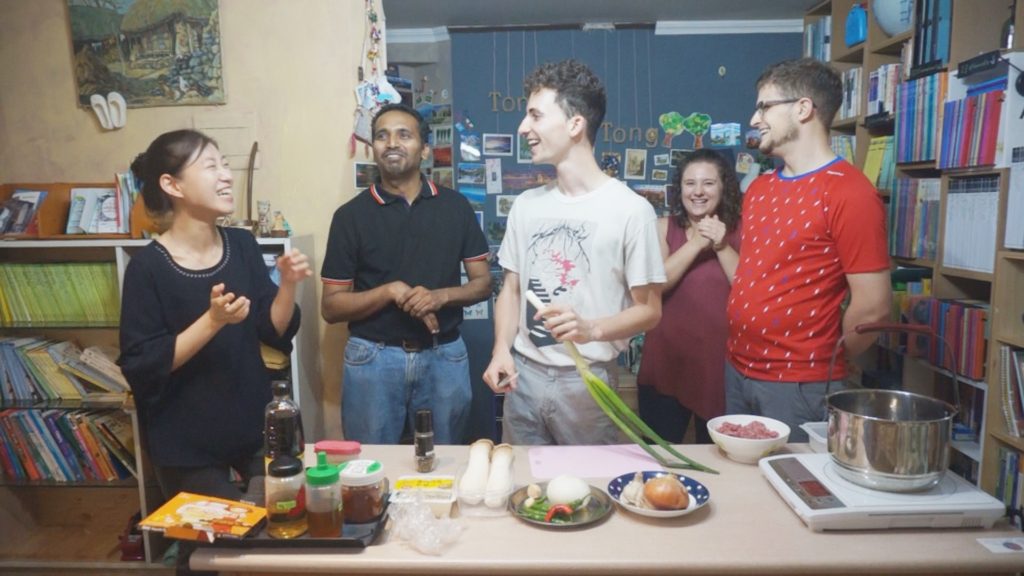
In 2004, I began to communicate with several teachers, including Chan-song. At first, not only Korean but also Japanese and Chinese teachers joined. We named the academy “Tong Tong Language Class” because it means that we can communicate through both language and our hearts. In 2018, Chan-song finally succeeded in scouting Pyeong-an, and sometime after that, Miranda New joined, too, completing our team. After completing her master’s degree in Korean Language Education at Chonnam National University, Miranda has been providing wonderful classes employing her strong background in language learning. All the foreign teachers who were with us in the beginning have since left Korea for personal reasons, and now we are only teaching Korean. We do not know what other languages will be included in the future, but our name is still Tong Tong Language Class.
— Ahn Pyeong-an: I joined in 2018. When I was studying abroad, I was interested in this field, as I taught Korean in the Korean club Arirang with Song-i and Chan-song, and I felt that I collaborated very well with Song-i. Honestly, I did not think I would become a Korean teacher at the time because my major was engineering. After graduating from college, I worked as a researcher for four years. When I saw Chan-song and Song-i working at Tong Tong, Korean language education seemed appealing to me, and I had a vision. While working at my former job, I gradually acquired related degrees and qualifications, and began working in classes and on textbooks in earnest from 2018. I also managed Tong Tong’s YouTube channel.
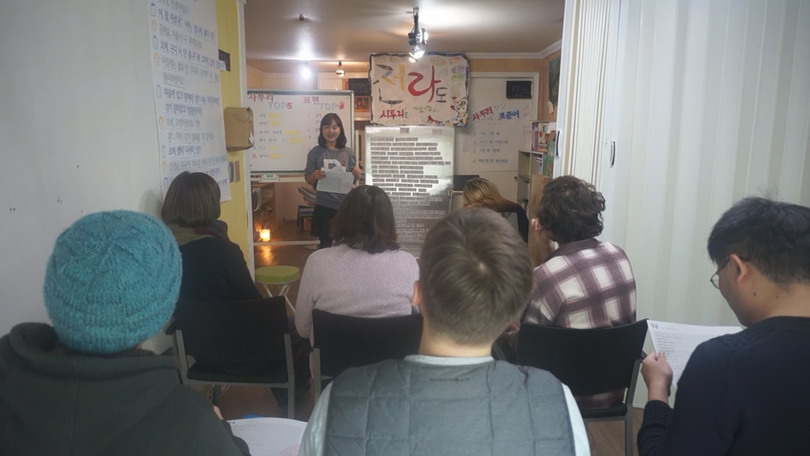
GN: What teaching methods do you use, and who are your target students?
— Hong Song-i: Usually, Tong Tong follows a regular program. In the regular class, we teach using our self-developed textbooks and a full-length book reading program. For the group classes, we do team teaching to make the most of the diversity and strengths of our respective team members. Special lectures or classes are held four to five times a year on various topics. I am constantly working on the textbooks, and my dream is to publish them someday. There are many different types of learners, so we need to meet their special needs. Students who are about to take the TOPIK or KIIP exams are preparing for those exams. There are also international students who want to get help with college entrance exams or classes and assignments.
— Ahn Pyeong-an: Currently, 70 percent of our students are native English teachers. As Song-i mentioned, there are students preparing for the TOPIK and KIIP exams, as well as office workers who want to correct their professional terms or intonation for a smooth work situation. Sometimes there are children who are about to enter elementary school or need help with their homework after entering school. We teach through a children’s program under the direction of Chan-song, who majored in early childhood education. Also, we teach Chinese characters that are frequently used in Korean.
GN: What do you like the most about teaching?
— Ahn Pyeong-an: I have liked teaching since I was young. I was not interested in studying because I was busy playing in middle school, but I was so into studying as a high school student that I used to tutor my juniors and friends for free. The reason why I like teaching is that if I share what I know with others, I can learn much more thoroughly from the process of teaching itself.

— Hong Song-i: I think so, too. While teaching Korean, I have met people from various cultural backgrounds with many different thoughts, which allows me to constantly learn. I try to learn my students’ mother tongues as much as I can, and as a result, I have learned English, Chinese, Japanese, French, Portuguese, and others. For most of these languages, I have not advanced beyond an elementary level, but I can understand the difficulties of my learners more deeply, which helps a lot when teaching. That said, I have learned not only languages but also culture, thoughts, and lifestyles that are different from mine. Little by little, I think I have learned to better accept people as they are.
GN: How is Tong Tong different from other language academies? Also, what are the main challenges in teaching foreigners the Korean language?
— Hong Song-i: First of all, it is because our teachers’ abilities are excellent. (Just kidding!) I think the advantage of Tong Tong is that we have small classes with a maximum number of six people. In addition, classes are planned according to the needs of the students. For example, among the special classes that have been held, cooking classes and dialect classes are memorable. Both classes were suggested and tested with students first. The response was also very good, to the point where we received requests to open them again. As a side note, Pyeong-an loves marathons, and he had a lot of fun with students who wanted to go on a marathon, and mountain climbing, when time permitted.
— Ahn Pyeong-an: When teaching a language, it is often difficult due to certain aspects not directly part of the language, such as the culture it coincides with, and I think this is the reason to constantly learn. I always feel that I have to study and consider my history and cultural background. I will always try to learn with a humble attitude. I think our strength is that we are good at motivating our students. There is also a time when many students face a slump in language study, but there are many long-term students at Tong Tong who have made tremendous progress. For example, a student who left Korea two weeks ago participated in classes online at Incheon Hotel during her return trip, and one student got up at 4:00 in the morning their local time to participate in a group class at 6:00 p.m. Korean time.

GN: Because of the COVID-19 pandemic, we know many businesses are facing hardships. Please tell us how the pandemic has affected your business.
— Hong Song-i: Of course, I was worried at the beginning of COVID-19, but Tong Tong’s advantage was that we had small classes and kept communicating with the students all the time. There were periods when meetings became difficult, and I was worried that we could not show our strengths. However, our strength has been even greater during the COVID-19 situation. Even though the academy was closed for several months, we still met online, sometimes exchanging homework for self-study. I did not stop communicating during those periods, and neither did the students. Tong Tong teachers always talk with one another. Crises come and go, but in fact, we are richer and warmer in our hearts as a result of our perseverance.
GN: What is the most rewarding aspect of your job? What is the most challenging part?
— Ahn Pyeong-an: I am very pleased not only when students improve their Korean language skills, but also when they show passion for Korean culture and open their hearts to Koreans. In addition, it is most rewarding when both the teachers and the students work hard to achieve their goals together. Not long ago, an international student at Korea University received a good grade with the help of Tong Tong, and they sent a thank-you message on SNS. And there is the time when I received a thank-you call from a student who passed the welding industry driver’s test, and another call from an international lawyer who finished studying legal terminology. I was also overwhelmed when a student sent me a message saying that they got good results on their entrance exam, TOPIK, and KIIP tests at Chonnam National University. I know how hard they had studied, and we tried our best to teach them. The most difficult part of this job is the parting moments. When there is a long-term adjournment that becomes necessary, I am deeply saddened. I have gotten used to it a lot now, but it still is not easy to say goodbye.
— Hong Song-i: At the entrance of the academy, there is an entire wall decorated with postcards. All of them were written by students during their travels or after leaving Korea. Each postcard is a special memory. At first, there were two postcards hanging on the wall, but the wall has become crowded over the years, so we are expanding the area to the other wall. When students leave Korea, they do not keep in touch as often as before, but they do not forget to tell us their good news on a special day. In February last year, when the spread of the coronavirus began, I received calls from a lot of people. And there are so many things to show off in regards to Tong Tong’s affairs, such as a design student who made the Tong Tong logo look really cool, and a computer programming student who made the Tong Tong app. I think the biggest difficulty in running the business has been dealing with the fact that some people treat our students differently because they are foreigners. It was sad for us to see students having a difficult time because of this. For example, in the early days of the business, I experienced giving up my first plan for a location in the face of strong opposition from local residents to Tong Tong’s planned office. The reason was foreigners, even though it used to be a daycare center. That experience aside, we are doing well in the place where we have settled down, feeling the consideration of the residents here, who are indeed very generous and kind.
GN: Thank you both very much for your hard work in teaching us the Korean language, and thank you for taking time to do this interview.
TONG TONG Language Class (통통‘언어’교실)
Address: 2 Sangmuowol-ro 51-beon-gil, (Ssangchon-dong), Seo-gu, Gwangju
광주 서구 상무오월로 51번길 2 (쌍촌동, 신천힐탑아파트 앞)
Email: tongtongkorean@gmail.com
Web: http://blog.naver.com/tongtong2014
Facebook: tongtong2014
The Interviewer
Melline Galani is a Romanian enthusiast, born and raised in the capital city of Bucharest, who is currently living in Gwangju. She likes new challenges, learning interesting things, and is incurably optimistic. She is currently learning Korean at Tong Tong Language Class. Instagram: @melligalanis

